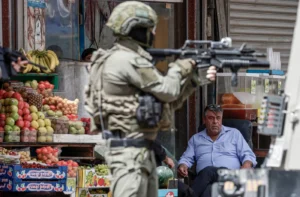Israel army stations soldiers in Palestinian homes to avoid Iranian strikes, residents say

An Israeli army soldier aims his rifle during a raid in the heart of the Palestinian city of Nablus, occupied West Bank, 27 May 2025
Fayha Shalash reports in Middle East Eye on 18 June 2025:
Palestinian sources have reported that the Israeli army has occupied a large number of homes in Hebron, Jenin, Ramallah and Qalqilya in the occupied West Bank, and converted them into military barracks after evicting their owners.
This surprise move coincided with the launch of Israel’s attacks on Iran last Friday. Analysts and residents have said that the army is stationing soldiers inside Palestinian homes and neighbourhoods to shield them from being targeted by Iranian missiles aimed at military camps.
In the towns of Rummana, Anin and Jalboun near Jenin, 17 homes were seized, while several other homes were taken in the southern area of Hebron and the town of Idhna to the west. Israeli soldiers also converted a three-storey building into a headquarters in the town of Birzeit, north of Ramallah.
Speaking to Middle East Eye from Hebron, Abdel-Jabbar Shabaneh told Middle East Eye that the Israeli army on Friday stormed the residential building where he, his brothers and several other relatives live in the Tel Rumeida neighbourhood. The soldiers forcibly evicted more than 50 residents, most of them children, citing security reasons. When the families asked to retrieve essential belongings, the soldiers assaulted them.
“The soldiers beat me, my brothers, and my cousins for at least an hour. We were hospitalised because we asked them how long they would be staying in the building and asked to take some items,” he said.
Later that same day, the soldiers left the building and allowed the residents to return – only to find their apartments ransacked. Their belongings had been vandalised, their furniture destroyed, and the interiors heavily damaged.
At 3am on Saturday, the soldiers returned to the building and evicted the residents once again, causing fear among the children and distress among the families, who left with nothing but the clothes on their backs.
